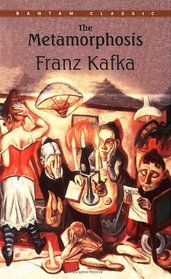Helpful Score: 1
This novel is a harrowing--though absurdly comic--meditation on human feelings of inadequacy, gulit and isolation. I hadn't read it since high school--I enjoyed it far more this time :).
Helpful Score: 1
A literary classic, deeply disturbing but difficult to ignore. The character's dilemma is haunting, and has the creeping familiarity of a nightmare.
Helpful Score: 1
This was my first read of this book and Kafka's writing. His work was written in German from which this has been translated. This tale focuses on Gregor Samsa's transformation from a man working a meaningless job into a beetle-like creature or a piece of vermin (German). His family struggles with the change and the story details what happens as a result of the transformation. Interestingly, when Gregor no longer is able to work the members of his family go out and find work. Gregor is no longer needed.
I know there are meanings behind the author's story. Perhaps it partly refers to the meaningless work often done to support a family. Gregor must have felt chained to that role when many family members could have been helping themselves. Some believe that Kafka was decrying capitalism. Some it takes on religious tones. If one wishes still other meanings can be extrapolated. Check out the essays at the back of this book for more discussion on the topic. Perhaps it is enough to know that Kafka had a great impact on literature.
Kafka's writings were published following his death by his good friend, Max Brod. Brod found the task difficult because Kafka would start writing in the middle of a book and work whatever way he felt like working. I am glad that I read this book but have been puzzled by the theme that he intended to leave with the reader. He was a highly educated, a lawyer, so I believe that he was a deep thinker.
I know there are meanings behind the author's story. Perhaps it partly refers to the meaningless work often done to support a family. Gregor must have felt chained to that role when many family members could have been helping themselves. Some believe that Kafka was decrying capitalism. Some it takes on religious tones. If one wishes still other meanings can be extrapolated. Check out the essays at the back of this book for more discussion on the topic. Perhaps it is enough to know that Kafka had a great impact on literature.
Kafka's writings were published following his death by his good friend, Max Brod. Brod found the task difficult because Kafka would start writing in the middle of a book and work whatever way he felt like working. I am glad that I read this book but have been puzzled by the theme that he intended to leave with the reader. He was a highly educated, a lawyer, so I believe that he was a deep thinker.




